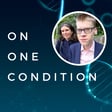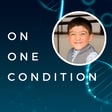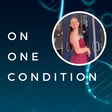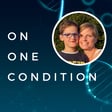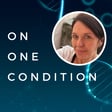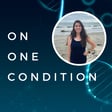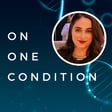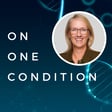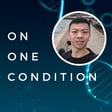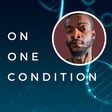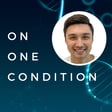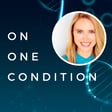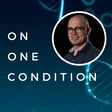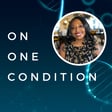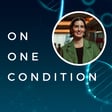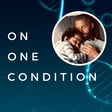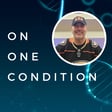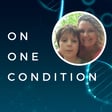Become a Creator today!Start creating today - Share your story with the world!
Start for free
00:00:00
00:00:01

Episode 54: Joanne Paquette - Ollier's Disease
Ollier's disease has shaped Joanne's life since infancy. Her story is one of resilience, adaptation, and hope, as she recounts the challenges of undergoing numerous surgeries, navigating family dynamics, and finding ways to thrive despite her condition. Our conversation dives into Joanne's work as the founder of RAREsies, her mission to support those with rare diseases, and her advocacy for education and awareness. Through her words, Joanne radiates a spirit of determination and a belief in the power of human connection. As she shares her struggles and triumphs, she offers profound insights into living with a rare disease and how one can turn adversity into strength.
The song that Joanne chose is Love Shack by the B-52's.
Transcript
Introduction to 'On One Condition' and Ollier's Disease
00:00:00
Speaker
Hi, I'm Sylvain Bertolo, and you're listening to On One Condition, a podcast to raise awareness about health conditions by listening to people who live them every day. My guest today is Joanne Packett, and we're going to talk about all year's disease. Hi, Joanne. How are you doing? Thank you so much. I'm doing well, thank you. Thank you for having me.
00:00:23
Speaker
Well, it's great having you. And as you know, I love starting with a song. So ah which song did you choose and why? And I know it was a difficult choice for you. Very, very difficult. The only song that keeps popping in my head because I love to dance to it is Love Shack.
00:00:44
Speaker
Oh, okay. Nice. I like that song. Is it just to dance or is there any other meaning? It's just a great song. I just enjoy it. it gives It's got a lot of movement to it, a lot of beat, and it makes me happy. Great. but i And I love music. I just i think it's the international language of the world. It brings people together.
00:01:12
Speaker
in a happy way. And I think it's just wonderful. Yes, and that's why I love music as well. You've summarized it very well.
Joanne's Diagnosis and Early Challenges
00:01:23
Speaker
So today we're talking about all year's disease, which is a ah rare disease which affects you. I want to start at the beginning. So when did you realize that you have all years and how did it impact you? Well, when I was born, my legs were kind of crooked. At six months old, both legs were placed in casts.
00:01:51
Speaker
um in order to give direction to the young bones. And that helped. But then when I started to walk and my dad had noticed that there was a discrepancy with my right leg. And as I grew, it was more and more evident that there was something wrong.
00:02:15
Speaker
We went to the doctor's office to an orthopedic surgeon, Dennis Desjardins, Dr. Desjardins, who happened to be a family member as well. He was my third or fourth cousin. He had become an orthopedic surgeon. He was still young and so on. And he had just returned from France, actually, and had heard of Ollie's disease. And he he was able to diagnose me nearly right away.
00:02:46
Speaker
So it it's what it is, Dr. Olie is the one who discovered the disease. I believe it was 1878, which is multiple and chondromatosis was the final diagnosis, meaning that I have multiple and chondromas, which are the name of the tumors that are in the cartilages. I was about four years old when that was the diagnosis was made.
00:03:15
Speaker
and surgery was set shortly thereafter I was four and a half years old. Or I'd just turned five in December and my first surgery was in January 1969. After I'd had my first surgery, um things had gone well. Dr. Desjardins did an incision along my femur and did bone grafts at that point, which is just scraping the at the removal of the tumors from the bone. They manifest through the cartilage, through the bone and where they cause lumps and deformities and replace the bone from the bone bank, which I did know existed really until I was a little older that they actually have a bank of bones that you know people need, like like a blood bank in a sense, but it's bones. So this occurs every year.
00:04:14
Speaker
until I was 14 and I would be in a body cast. How long were you in the body cast for? i was and I'd be in the hospital for about two weeks and I was in the body cast, pardon me, for six to eight weeks. Wow. so Every single year for 10 years? Yeah. And then in between that, I would fracture something.
00:04:43
Speaker
usually my femur, which I fractured five times. So it it did an impact on my life because of school um and so on. So I did miss out on a lot of school. So I was away from home. I was away from school. That was an impact on me because I was just a kid.
00:05:10
Speaker
And those are the important years of socializing, learning skills that you don't normally, you don't learn in a hospital room, put it that way, really. I found a way or ways to ensure that my days were filled. And I always tried to um have a smile. So a smile to me means a lot because when you smile at someone, they smile back. And that right there is is joy. And that really to me, that really helped get my days through. um i would yeah If I could leave my hospital room, I would try. um And I would go chat with other kids because just to make them smile and so on.
00:06:05
Speaker
Yeah. so could i like Could you move when you were in the hospital? I learned to use crutches very well. I was i couldn't go in a ah wheelchair per se because of the body cast. Now with my first cast, if we could go back for a second, my first body cast, I learned to walk in.
00:06:29
Speaker
which the doctors were not, and they were impressed, but they were like, no, no, no, she can't do that. ah So yeah the body cast consisted of casting from just at my chest area down and all the way down my right leg. So what they did is they added a cast partial ah to my left side, ah um all the way just above the knee.
00:06:55
Speaker
And then they put a cast bar in between the two legs so that I couldn't walk or move. It wasn't possible. So I jokingly would call that my dad's handle so he could carry me upside down.
Adapting to Life with Ollier's Disease
00:07:15
Speaker
um It did help my father move me around more, but I was always a determined child. If I wanted to get somewhere and I couldn't, I would drag myself. I would drag myself. My elbows became so raw.
00:07:31
Speaker
that my mother made me some little elbow pads out of a sheep wall because i would just I just didn't stop. i If I had to drag myself up or down the stairs, I would, ah but I always found a way.
00:07:46
Speaker
And to me that's called adapting. yeah And it's something that I think people need to learn to do no matter what your health condition is. ah The world isn't to adapt to you, you must adapt to the world and that can help your your journey um go a long way. Yeah. Yeah. And so thinking about those surgeries every year, the the fractures in between. And now looking back at your childhood, I mean, you you talk about it very positively, but do you do you feel like you missed anything in your childhood? I do. I do.
00:08:37
Speaker
It wasn't, ah we didn't have support back then. Not like today, although we lack a lot of support, but there was no one to turn to for the disease. There was no support for my parents and there was no family dynamics support because I had the attention that I did have.
00:09:02
Speaker
Because of all my surgeries, it caused friction um in the family. um I felt ah like the outcast. um my brother One of my brothers had a very difficult time dealing with it and sadly would take it out on me. um However, I mean, like I forgive him for this because I must forgive. It's an important factor.
00:09:31
Speaker
I also want families to have a strong dynamic field because everybody needs to be involved when there's a health and serious health matter in a family.
00:09:43
Speaker
aye So it was it was difficult and I missed out. As I said, I didn't know if I fit in at school. I didn't fit in at home and I didn't fit in at the hospital. However, the hospital was my comfort zone because then I wasn't at home and I didn't feel like I was causing friction in the family. You were in in the right place at that time.
00:10:11
Speaker
Yeah. So, um, with that said, I, it just, I believe it made me a stronger person. I became independent at a very young age. Um, back in my first surgeries, parents weren't allowed to stay at the hospital with you overnight. Parents couldn't, they could only visit during visiting hours. No outside food was allowed. You ate what you got. Um,
00:10:40
Speaker
So it was it was a different way of life back
Medical Support and Transition
00:10:44
Speaker
then. There was no children's hospital at all. yeah of The best thing I can think of that occurred with me for that time is that the doctor I had was not pediatric nor ah ah nor adult in a sense. okay I was able to keep him after I turned 18 because I started with him.
00:11:09
Speaker
And he wasn't just in pediatric care. So as people know, when you turn 18, you stop pediatric care. And that's a very difficult transition for people who have had a doctor all their life, especially with rare diseases. And now they have to try and find a doctor that is knowledgeable in this or start your whole story over and go on and on.
00:11:38
Speaker
And that's a difficult transition. I am very blessed and lucky to have not gone through that because Dennis was my doctor from the beginning. There was no children's hospital. Um, when I turned 18, I started going to the adult hospital and he was already there. yeah So there was no transition for me, which was wonderful. Uh, the only transition I did have is when he retired. Okay.
00:12:08
Speaker
However, when he retired and I had surgeries, he would show up at the hospital. He would be there to make sure that the doctors treated me with respect and did the proper thing with me. That's amazing. You don't find that anymore. You just don't find that anymore. Yeah, he sounds like a wonderful person. Yeah, he passed away. and um I sincerely miss him with all my heart. I used to tease and say to him that the Mercedes Benz he owned in the parking lot was because of me.
00:12:44
Speaker
Yeah, it was paid with all the surgeries. Yeah, that's right. That's right. so um So it was a while back. Do you know if people, children with oleae have to go through the same amount of surgeries as you did and and have a similar childhood as you did? Or do you know if it has evolved now?
Living with Ollier's Disease: Trials and Triumphs
00:13:13
Speaker
Well, ah first off, I was a guinea pig.
00:13:17
Speaker
So, which now they call clinical trials. um So with that said, I've had more surgeries than most people. However, necessary surgeries are about the same with this de disease. Now the disease affects us in individually. It's not necessarily all the same or that we have it in the same place. However,
00:13:46
Speaker
The surgeries that are needed are the bone grafts to remove the tumors replaced with the bone graft. The other factor is limb length discrepancy. My right leg was 7.4 centimeters shorter than my left leg. So it was quite a bit. I was called hop along in school. That was my nickname, which I went with it because I did hop along. It was it was a factor and i I didn't mind it because I took it from them with a good place. So if if you can have that mindset, it truly helps your journey. So my first like leg lengthening procedure was at the Children's Hospital, CHEO here, Children's Hospital of Eastern Ontario in Ottawa. And I was the first in North America with the disease, especially to have the Wagner device on my leg ah for lengthening.
00:14:44
Speaker
It's more common to have two procedures in order to achieve the the length um that is required. However, due to my situation at home, I left when I was 16 and I wasn't able to have my my other surgery, my second surgery. So I still have a discrepancy of, I would say,
00:15:09
Speaker
Now I'm going to go to inches, so it's about two and a half inches ah discrepancy now. So I have a shoe with a lift. I also have scoliosis due to the leg length discrepancy. So that, that's another factor. And of course, as I'm aging, like everybody else, I'm, you know, things aren't the same. um I do have osteoporosis. I have osteo and chondroma, which is a very rare as well.
00:15:39
Speaker
but the the procedures are required. So I would say between diagnosis and the age of 18, you could have anywhere from six to 20 surgeries, depending on what and where the disease affects you. Cause it affects mainly it it was the toes and hands, the fingers um and the long limbs. So I'm affected in my toes.
00:16:08
Speaker
I'm affected in my lower, my tibifibia, my femur and on my right arm as well. so Is it painful? It is painful. um The pain is more due, I believe, to my fractures and all my surgeries is where my pain, I believe stress is from mostly.
00:16:34
Speaker
When my mother states that when I was younger, I would start feeling pain in my femur. i wasn't I wasn't a complainer. I just didn't say anything. It is what it is was my mindset. However, my mom would find that I'd cry. And then I'd finally say after a few days, yeah, my my leg hurts a lot. It's really hurting. And that usually meant surgery time.
00:17:01
Speaker
that it was time to go in and do some bone grafts and so on. so was it Was there a a part of you that who didn't want to admit to the pain because you knew it would lead to surgery? I don't think so. I don't think so because I didn't care. It was just who I was. It's just who I was. I didn't know any differently. When I had CAS on at six months,
00:17:27
Speaker
I was still playing like a kid. I was a baby. I was still moving my legs up and down like a baby does. I just didn't know any differently. And I believe that because it started at such a young age, it was just incorporated into who I am. And so I would just go with it. The only time that I really felt it affected me and so is when I wanted to do sports.
00:17:57
Speaker
and i was in there and I would be told no. Well, little old me would just go do it anyway. just to Just to defy and to show that I could. I would go skiing. I would skate. I would i played i was on the basketball team in an intermediate school, grades seven and eight. wow I was more of a bench warmer. However, I was on the team. Yes, they put me on the team more out of pity than anything. And that's fine by me. I was having fun. I was a kid. And that to me is very, very important. Now, as I want families to do the same, let your kid be a kid yeah um and let them enjoy what they think their confidence is.
00:18:52
Speaker
their, what their limits, they will learn their limits by allowing them to develop and learn who they are. Um, it can be fearful. Absolutely. My mother would cringe at the things that I would go and do, but I felt like, um, I was a kid like anybody else. yeah So the other factor is that I would get stared at a lot.
Self-Acceptance and Education
00:19:20
Speaker
because my leg was deformed oh yeah um because of the scars. A friend of mine told me one day that I shouldn't be wearing shorts because everybody looks at me. And I said, well, you're wearing shorts. It's summertime. What's the problem here? So my mindset was very different. And i didn' and if people seared, and they still do, I smile.
00:19:48
Speaker
And I say, do you want to ask me anything? Or I'm OK. Or this is because instead of being insulted or thinking that, oh, they they they I'm ugly. I'm ugly. or I should just hide. I'm proud of who I am. I'm proud of what I've done. And I'm proud that if I can help anybody else's journey find comfort in this, then I'm i'm really happy with that. I'm very happy with that.
00:20:19
Speaker
And also, we're talking a lot about your surgeries or about the surgeries you've had in the past. Now, does Ollie affect you at all? Or have all the surgeries kind of put you in a state where you your body is now functioning in a way? i My body functions. I always do. i um I always, my limits are always pushed. I always try. There's things that I am more fearful of doing now because I'm older. So um it's not the same. However, I have more consideration now for who's around me, my children.
00:21:09
Speaker
My kids don't want to see me in pain. My kids do not want to visit me in the hospital. My kids, you know, they would prefer that I be a little more cautious about things, um, in order to not create pain for myself and therefore creating pain for them. Um, so that that's of course a mindset as well now.
00:21:34
Speaker
But I still am in pain, especially like my back hurts continuously. My femur um my femur is still deformed and I had a knee replacement full knee replacement in May of 2008 and they had to reconstruct my femur and insert a rod into it.
00:21:57
Speaker
in order to get the knee to kind of stay, the knee replacement to stay. um So ah so it was it was you know it was quite interesting. yeah But now it's more, if I fracture something, it can affect me. It takes my bones longer to heal. yeah So that's another factor. However,
00:22:22
Speaker
it's it's it I to always try to set it aside and remember that I still have to do things in order to function. I'm not just going to sit on a chair all day and do nothing because of this. I'm quite capable. I mean, there's there's so much that I can offer, I believe, because my brain is still very active.
00:22:49
Speaker
My brain is still very active and very happy and bright. So as as long as that is still going, what um i am I'm happy with that. The pain factor, I'm on medication for pain. And as I have stressed, my father, who is still alive, thank you, at 93 years old,
00:23:15
Speaker
wow um tells me get more something more for your pain. And in order for me to be pain free, I would have to be heavily medicated. And I cannot function that way. That's not using my brain to its fullest capacity. My brain is impaired.
00:23:36
Speaker
Um, and I could not be a good mom. I could not do, you know, function the way that I would like to function and have somebody care over me and, you know, do this and do that for me when I still believe that I can do it.
00:23:52
Speaker
And it's tricky with pain medication as well because there's a risk of dependency dependence and yeah the fact that it can impact your if ah your brain function in a way. Yes. And if I look back at it, Sylvain, I have been on drugs since I'm four and a half years old yeah because of all my surgeries. um It was morphine, morphine, morphine.
00:24:20
Speaker
yeah That's because that's all we had really back then kind of for the pain. But I have been on medication and drugs basically all of my life. um And that I am extremely happy and proud that my liver is intact. My kidneys are intact.
00:24:40
Speaker
So you know I make sure that I do not abuse what I have so that my body does not break down on me nor will my brain um be fully affected yeah by it. That's super important.
00:25:00
Speaker
So I'd like to move to something related, but slightly different.
Founding Raresys and Advocacy
00:25:06
Speaker
So you created Raresys and I'd love to talk to you about it and learn more. So could you explain what it is? Absolutely. So I came up with Raresys rule about 14 years ago.
00:25:26
Speaker
um I incorporated in 2019 as a nonprofit in Canada. And my mission is to ensure that family dynamics are strong and liable and that you have support. My other part is education. I missed out. I regret that. I educated myself along the way.
00:25:53
Speaker
um And we raise funds for educational scholarships for rare seas because I don't care what your grades are. I honestly don't. I care that you will be stable, that you'll be proud of yourself, you'll be confident, and that you'll achieve um stability.
00:26:13
Speaker
ah you know um That to me is more important than a lot of other factors because no matter what you have or so on, being proud and confident is is an important factor that kids need to have as they grow so that as adults, they can use those skills um and and achieve something. like So what do you do concretely in with rare disease? So I'm the founder and CEO.
00:26:47
Speaker
Um, we are trying to bring as much awareness as possible. Um, with that said, I am trying to do that via a couple of things. I would like to, uh, curriculum, school curriculums to introduce rare diseases, um, in grade nine and then in grade 10, develop more like different stages of it for grade 10, grade 11 and grade 12 from gene therapy, cell therapy to um introducing research and so on, just to put a plant in there, a seed in their minds that one, rare diseases exist. And perhaps this is something you'd be interested in going into for the research as a doctor, no matter what. But if you're not aware of its needs, then you can't do anything about it. The second part where I'd like to bring awareness
00:27:43
Speaker
is with our city councilors, I am looking at a new development of housing, um, and put the street names. The first street name would be rare seas rule way. And the other street names would be rare diseases in order to bring awareness so that people can question the street name, um, and maybe even look it up and then learn something. Um, you know,
00:28:12
Speaker
just, again, we go back to education in a way, the more you learn, the better you are, the wiser, the more confident that you can become. um But yes, that would be, and if we could do that here with the street name signs, hopefully we could do that across Canada and then start implementing around the world.
00:28:36
Speaker
okay It's interesting because when I think about this podcast, people have to find it and and you need to be not necessarily actively looking for it, but it's still something that you have to do. You have to listen to it. Whereas what you're suggesting is that something could be in front of you every single day and it becomes more of a norm. Is that your objective? That's
The Importance of Awareness and Education
00:29:07
Speaker
correct. it's It's more of a norm. um It's more understanding. the public If the public could understand the challenges that families face that have much more serious rare diseases than I do, if the public can understand our battles and understand why we
00:29:32
Speaker
fight with the government to try to achieve more, they could help us and support us by knowing that this is going on and what the disease has done and what how this rare disease has affected families. To me, I think if we start at the base and so try to start like a plant, like a tree, put a seed in and bring it and branch it out, I think we could achieve much more.
00:30:00
Speaker
Yeah, I agree. And I really like what you're saying. ah Thank you. I'm not in your situation. So correct me if if I'm saying something wrong, but I can imagine that in your position,
00:30:13
Speaker
with what you've gone through in your life. There is a lack of understanding from others who may complain about very little things. And compared to to what you've been through, those little things are close to nothing from your point of view. And I love what you're doing, what you're saying, because I agree, I think people sometimes like points of view that make them realize that what they're going through is not as bad as what they think. Exactly. like Absolutely. And I'm not anybody who says to me, Oh my God, that hurts. Like friends of mine will often complain about something and then they'll laugh. Haha. Yeah. you You've only had 51 surgeries. You don't know anything about pain. And they, I know they're joking.
00:31:07
Speaker
and But I say often and I'll say like your pain is not less meaning than my pain It's still your pain is still a value. However Really? Do you really need to complain about that little Bobo? yeah You know what I mean, so it's interesting um but again, it's back to the understanding and and and then acknowledgement and of what the person is challenged with. What's the response you get from the council? Actually, it's been very good. um ah The city councilors are very much willing to help. ah We have a few issues that affect it and so I need to do more fundraising. A street sign is $500. Now, if we can have an organization, what I've been trying to do is sell t-shirts.
00:32:05
Speaker
with to any organization that rare disease organization that buys t-shirts, their organization name goes into the draw of which street names we will we will pick um because I want it to be fair as well. um And this will also, the funds will help raise money for our educational scholarships and then for the street signs. um Now,
00:32:34
Speaker
I'm trying to work with Citi to lower the price of the street signs, get the contracting company to help donate some funds for the street signs, and hopefully turn this into something that would be less costly, but provide a wealth of information. Yeah, that's very interesting. Very interesting. I will want to hear more once ah once you've got there.
00:33:06
Speaker
Oh, it's been an absolute pleasure, Joanne. Before we end, I always love asking that question to my guests. What's your happy place, a place where you feel at peace? Oh, honestly, at home. And if my granddaughters visit, my day is complete. Oh, nice. My day is complete.
00:33:33
Speaker
Amazing. It's it's it's sure um it's truly what what brings me such joy. Yeah. Sometimes I can't wait for them to go home, but yes. Well, that's a different kind of pleasure as well. That's right. yeah yeah ah ah I've written a few words as you were talking, ah but there's this one thing that really will stay in my mind as I remember our discussion. It's joy in a smile.
00:34:12
Speaker
Thank you. Absolutely. I love what you said about smiling to people. Yes, that's true. If everyone was smiling to each other, I'm sure life would be a brighter place. Absolutely. I'm impressed with the determination, resilience, and your positivity. It's contagious, so keep it like that. It's amazing.
00:34:39
Speaker
Thank you, Silve. I truly appreciate that. Thank you. um i just i'm I'm glad I see your smile and I just love it it. I can hear it in your voice too, so I think that's wonderful. Yeah. Well, thank you so much, Joanne. It's been a truly amazing discussion. Well, thank you, Silve. It was my pleasure. And I hope we can do it again.
00:35:06
Speaker
um once those street sign names are going. Yes, yes. Thank you.
